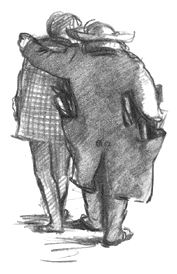Vie de Boheme How the Bohemian Club was Founded

12 of 24
“And what of my word of honour?” said the artist with dignity.
“It’s not like furniture … you may seek lodgings elsewhere. Durand will give you back your earnest-money.”
“Eh?” said the janitor, taken aback. “I’ve put it in the savings-bank.”
“But, sir,” replied the young man, “I can find no other lodgings at a minute’s notice. Grant me hospitality at least for a day.”
“Go lodge at the inn,” said M. Bernard. “By the way,” he added, after sudden reflection, “that room that you were to occupy, I can let it to you furnished, if you wish. It contains the furniture of my insolvent tenant. But you understand that, in agreements of this sort, rent is paid in advance.”
“The question is, what would you charge me for the hole?” said the artist, seeing no other way out.
“The rent is very reasonable: twenty-five francs a month, in view of the circumstances. Paid in advance.”
“You said that before. The phrase is not worthy of repetition.” The young man rummaged in a pocket. “Have you change for five hundred francs?”
“What? What did you say?”
“Why, a half-thou’, you know. Never seen one?” The artist brandished the note in front of the landlord and janitor, who seemed knocked off their balance.
“I shall see that you get your change,” said M. Bernard respectfully. “There will be only twenty francs to pay, since Durand will give you back the earnest money.”
“He may keep it, on condition that he comes every morning and tells me what day it is, the date and the month, which quarter the moon is in, the state of the weather and the form of government under which we are living.”
“Ah, sir!” old Durand exclaimed, bowing himself double.
“I shall send you your receipt, sir,” said the landlord.
That same evening M. Bernard’s new tenant, the painter Marcel, was installed in the exiled Schaunard’s lodging, now transformed into a palace.
Meanwhile, Schaunard himself had been patrolling Paris on what he was wont to call his ‘financial levy’.
Schaunard had developed borrowing into a fine art. In preparation for a time when he might have to ‘touch’ foreigners, he had learnt how to borrow five francs in all the languages under the sun. He had made a deep study of all the tricks that coin uses to escape its hunters. Better than a pilot knows the times of the tides, he knew when and where it was high water or low water: that is to say, the days when his friends and acquaintances were accustomed to receive money. In various houses throughout Paris, people would say, on seeing him enter, not: “There goes Schaunard,” but: “This is the first (or the fifteenth) of the month.” To facilitate, and also to spread out evenly, this system of tithe-gathering, which he practised, when necessity drove him to it, upon all who had the means to contribute, Schaunard had drawn up an alphabetic table, arranged by Quarters and districts, of the names of all his friends and acquaintances. [To be continued …]
[Vie de Bohème by Henry Mürger, a vivid portrait of the ‘Bohemian’ life of the artistic quarter of Paris in the nineteenth century was originally published (by Michel Lévy) in 1851. The extract above is taken from a translation by Norman Cameron, published by Hamish Hamilton. The illustration is by Dodi Masterman.]
Leave a Response
You must be logged in to post a comment.

